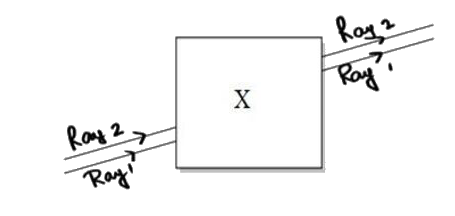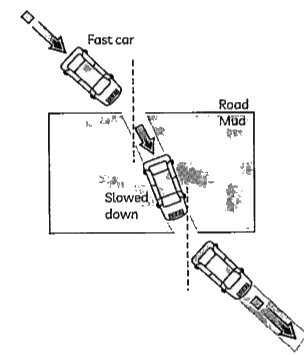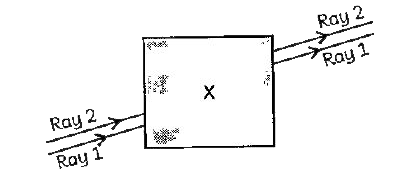Statement-1: You see a geostationary satellite above the horizon. You desire to communicate with the satellite by sending a beam of laser light. You should aim your laser slightly higher than the line of sight of the satellite.
Statement-2: Light bends away from the normal while moving from denser to rarer medium.
Statement-1 is true, statement-2 is true and statement-2 is correct explanation for statement-1.
Statement-1 is true, statement-2 is true and statement-2 is NOT the correct explanation for statement-1.
Statement-1 is true, statement-2 is false.
Statement -1 is false, statement -2 is true.
The correct Answer is:D
Laser maintain its line of sight.
Topper's Solved these Questions
- BOOK - BANSALCHAPTER - MASTER PRACTICE PROBLEMEXERCISE - Multiple objective131videos
MASTER PRACTICE PROBLEM
- BOOK - BANSALCHAPTER - MASTER PRACTICE PROBLEMEXERCISE - Subjective107videos
MASTER PRACTICE PROBLEM
- BOOK - BANSALCHAPTER - MASTER PRACTICE PROBLEMEXERCISE - Comphrehension134videos
MASTER PRACTICE PROBLEM
- BOOK - BANSALCHAPTER - FLUID MECHANICSEXERCISE - PYQS AIEEE10videos
FLUID MECHANICS
- BOOK - BANSALCHAPTER - SEMICONDUCTORSEXERCISE - CBSE Question32videos
SEMICONDUCTORS
Similar Questions
Read the statements given below and identify the concepts explained in them.
When Reema observes a light ray coming from medium 2 into medium 1, she sees that the ray bends away from the normal while entering the medium 1. Which medium in this case is optically rarer?View SolutionNoor, a young student, was trying to demonstrate some properties of light in her Science project work. She kept ‘X’ inside the box (as shown in the figure) and with the help of a laser pointer made light rays pass through the holes on one side of the box. She had a small butter-paper screen to see the spots of light being cast as they emerged.

Her friend noted the following observations from this demonstration:
i. Glass is optically rarer than air.
ii. Air and glass allow light to pass through them with the same velocity.
iii. Air is optically rarer than glass.
iv. Speed of light through a denser medium is faster than that of a rarer medium.
v. The ratio: sin of angle of incidence in the first medium to the ratio of sin of angle of refraction in the second medium, gives the refractive index of the second material with respect to the first one.
Which one of the combination of the above statements given below is correct.View Solution
Knowledge Check
- Question 1 - Select One
STATEMENT-1 A fish inside a pond will see a person standing outside taller than he is actually.
STATEMENT2 Light bend away from the normal as it enters water from air.ASTATEMENT -1is true statement 2 is true,Statement -2is a correct explanation for statement -1BSTATEMENT -1is true statement 2 is true,Statement -2is a not a correct explanation for statement -1CStatement -1is true,Statement -2is FalseDStatement -1is False ,Statement -2is True - Question 2 - Select One
Suppose a car is travelling across the road towards a muddy track at an angle , the mud shows down side of the car, and the path of the car bends. The more it is slowed the more is bends. Upon exiting the track on the opposite side, the car speeds up and achieves its original speed . This analogy represents light wave travelling from rarer medium to denser medium . Thus , a ray of light travelling from a rarer medium to denser medium bends towards normal . When it travels from closer medium to rarer medium, it bends away from normal

A ray of light continues moving along the same path while passing through air, glass interface . The angle of incidence for the ray isAzeroB90∘Cless than 90∘Dgrater than 90∘ - Question 3 - Select One
Case : Noor, a young student, was trying to demonstrate some properties of light in her Science project work. She kept 'X' inside the box (as shown in the figure) and with the help of a laser pointer made light rays pass through the holes on one side of the box. She had a small butter-paper screen to see the spots of light being cast as they emerged.

Her friend noted the following observations from this demonstration:
(I) Glass is optically rarer than air.
(II) Air and glass allow light to pass through them with the same velocity.
(III) Air is optically rarer than glass.
(IV) Speed of light through a denser medium is faster than that of a rarer medium.
(V) The ratio: sin of angle of incidence in the first medium to the ratio of sin of angle of refraction in the second medium, gives the refractive index of the second material with respect to the first one.
Which one of the combination of the above statements given below is correct.A(II), (IV) and (V) are correctB(III) and (IV) are correctC(I), (IV) and (V) are correctD(III) and (V) are correct.
1. Keep your watch accurate. For some people, moving up the time on their watch will help them get up earlier. For others, they will remember that the time on the watch is wrong and will disregard it altogether. It may be helpful to set your watch just two minutes ahead instead of five or ten.
2. Keep a clock, phone, computer or anything that displays time in each room of your house. One of the easiest ways to run late is simply by not realising that the time is passing as quickly as it is.
3. Set all your clocks and watches to the same time. Don't be an optimist. Things usually take longer than what you'd expect, even without major delays. If you have a dinner appointment at 7.30 p.m., don't think you can work till 7 p.m., then take a bath, dress and reach on time. Realistically, calculate the time you will take at each step and then add 10 minutes more to allow for unexpected delays, or you cannot get to your job in time.
4. Wake up when you are supposed to wake up. Don't hit the snooze button, keep on lying in bed, and watch TV at the very start of your day. May be try even setting your clock 10 minutes earlier than you need. If you have difficulty with this, move your alarm clock to somewhere away from your bed, that way, you have to get up to turn it off. Commit yourself to being 15 minutes early for everything. If you have to reach your place of work at 8.00, don't even tell yourself this. Just tell yourself (and everyone else who listens - but don't annoy them or make them think that they are late or early!) “I have to be at work at 7.45.” If you do this, you will be on time even with little unforeseen delays. You will be on time even with a traffic jam.
On the basis of your reading of the above passage answer the question:
It is good to commit yourself ______for everything.View SolutionI will never forget that day. It was a day in BSF academy at Tekanpur. We were a batch of 96 officers being taken for an intensive training in arms. Of these, 20 of us engineers and IITians. Having studied projectile motion during our school days, we were quite keen to see it being demonstrated in case of. weapons, the man showing us the demo was using an AK-47 fitted with tracer bullets. As they were fired, we could actually see them, they would emit light. First of all the man fired at the center of the target 30 m away while firing horizontally. We could actually see the bullet moving in a parabolic path and hitting 2 cm below the target. ''You see. That is what I said. For accurate firing you need to aim not at the target but slightly above.'' (g=10m/s2)
What was the initila velocity of the bullet?View SolutionI will never forget that day. It was a day in BSF academy at Tekanpur. We were a batch of 96 officers being taken for an intensive training in arms. Of these, 20 of us engineers and IITians. Having studied projectile motion during our school days, we were quite keen to see it being demonstrated in case of. weapons, the man showing us the demo was using an AK-47 fitted with tracer bullets. As they were fired, we could actually see them, they would emit light. First of all the man fired at the center of the target 30 m away while firing horizontally. We could actually see the bullet moving in a parabolic path and hitting 2 cm below the target. ''You see. That is what I said. For accurate firing you need to aim not at the target but slightly above.'' (g=10m/s2)
At what angle should the bullet have been fired as to hit at the center keeping the gun just on same level of target?View Solution1. Keep your watch accurate. For some people, moving up the time on their watch will help them get up earlier. For others, they will remember that the time on the watch is wrong and will disregard it altogether. It may be helpful to set your watch just two minutes ahead instead of five or ten.
2. Keep a clock, phone, computer or anything that displays time in each room of your house. One of the easiest ways to run late is simply by not realising that the time is passing as quickly as it is.
3. Set all your clocks and watches to the same time. Don't be an optimist. Things usually take longer than what you'd expect, even without major delays. If you have a dinner appointment at 7.30 p.m., don't think you can work till 7 p.m., then take a bath, dress and reach on time. Realistically, calculate the time you will take at each step and then add 10 minutes more to allow for unexpected delays, or you cannot get to your job in time.
4. Wake up when you are supposed to wake up. Don't hit the snooze button, keep on lying in bed, and watch TV at the very start of your day. May be try even setting your clock 10 minutes earlier than you need. If you have difficulty with this, move your alarm clock to somewhere away from your bed, that way, you have to get up to turn it off. Commit yourself to being 15 minutes early for everything. If you have to reach your place of work at 8.00, don't even tell yourself this. Just tell yourself (and everyone else who listens - but don't annoy them or make them think that they are late or early!) “I have to be at work at 7.45.” If you do this, you will be on time even with little unforeseen delays. You will be on time even with a traffic jam.
On the basis of your reading of the above passage answer the question:
It is good to set our watch:View Solution1. Keep your watch accurate. For some people, moving up the time on their watch will help them get up earlier. For others, they will remember that the time on the watch is wrong and will disregard it altogether. It may be helpful to set your watch just two minutes ahead instead of five or ten.
2. Keep a clock, phone, computer or anything that displays time in each room of your house. One of the easiest ways to run late is simply by not realising that the time is passing as quickly as it is.
3. Set all your clocks and watches to the same time. Don't be an optimist. Things usually take longer than what you'd expect, even without major delays. If you have a dinner appointment at 7.30 p.m., don't think you can work till 7 p.m., then take a bath, dress and reach on time. Realistically, calculate the time you will take at each step and then add 10 minutes more to allow for unexpected delays, or you cannot get to your job in time.
4. Wake up when you are supposed to wake up. Don't hit the snooze button, keep on lying in bed, and watch TV at the very start of your day. May be try even setting your clock 10 minutes earlier than you need. If you have difficulty with this, move your alarm clock to somewhere away from your bed, that way, you have to get up to turn it off. Commit yourself to being 15 minutes early for everything. If you have to reach your place of work at 8.00, don't even tell yourself this. Just tell yourself (and everyone else who listens - but don't annoy them or make them think that they are late or early!) “I have to be at work at 7.45.” If you do this, you will be on time even with little unforeseen delays. You will be on time even with a traffic jam.
On the basis of your reading of the above passage answer the question:
We shall disregard the time displayed by our clock when we set it:View Solution

